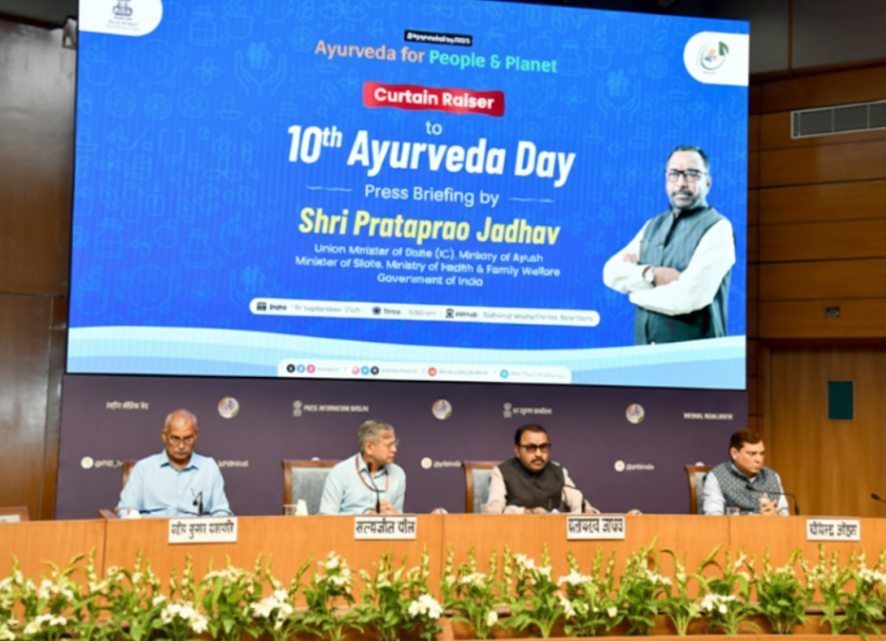India Celebrates 10th National Ayurveda Day on 23 September with A Call for Sustainable Health
- Industry Healthcare New Trending News
- Entrepreneurs Story
- September 23, 2025
- 216
- 8 minutes read
Introduction
Importance of Ayurveda Day
Ayurveda day being strikes an extensive chain of actions which includes educational based initiatives, seminars, medical camps, as well as public outreach campaigns to raise huge awareness about the benefits of Ayurveda. Beside this, it also honors the significant support of Ayurvedic practitioners along with the researchers who worked hard to authorize and upgrade this prehistoric system.

National Ayurveda Day
Along with this day aims to fit into Ayurveda in conventional healthcare, show its competence to subsidies towards nationwide health programs, and cultivate public awareness of its extraordinary philosophy. The day offers a platform in order to discuss the role of the system in addressing the modern health challenges, supporting international health initiatives and also promoting healthy lifestyles.
Ministry of Ayush Celebration
The Ministry of Ayush devoted 23rd September as Ayurveda Day, by providing the ancient knowledge system a worldwide identity and allowing huge involvement at the international level. September 23 has been preferred since it coincides with the autumnal equinox, a day when night and day are almost equivalent.
Today, at the All India Institute of Ayurveda (AIIA), Goa, the Ministry of AYUSH celebrated the 10th National Ayurveda Data. The event has been graced by a number of dignitaries which involved Shri Prataprao Jadhav, Union Minister of State (I/C) for Ayush, Union Minister of State for Power and New & Renewable Energy Shri Shripad Yesso Naik, Dr. Pramod Sawant, Chief Minister of Goa, and Shri Ashok Gajapathi Raju, Governor of Goa. Since its setup, the Ayurveda Day has emerged within the international platform for policy dialogue, outreach, along with awareness.

Within India, Ayurveda Day aligns with both India’s international sustainable development objectives as well as its cultural ethos, and also deliberates on its combined resolution to harness the full capacity of Ayurveda for a healthier planet and international well-being.
Development of Ayurveda in India
The development of Ayurveda in India started during the Vedic period, emerging from ancient understanding within a prearranged medical system. It can be said that the integration of Ayurveda within the Drug and Cosmetic Act, along with the development of the Central Council of Indian Medicine (CCIM), contributed to the quality assurance and standardization of Ayurvedic drugs.
The introduction of these initiatives is intended to improve the availability of Ayurvedic knowledge, nurture innovation within the Ayurvedic industry, and enhance community health evaluations.

The emphasis of Ayurveda day is towards minimizing resource pressure and preventative health, sustainable nutrition and health, preservation of biodiversity, harmony with natural components, along with social and mental well-being.
Objectives of the Ayurveda Day
- To generate significant awareness that Ayurveda is an evidence-based scientific medical system.
- Minimize the disease burden and related mortality and morbidity through harnessing the untapped possibilities of Ayurveda.
- Position and promote Ayurveda on the international front of healthcare.
- Develop a culture of “illness to wellness” via Ayurveda for its holistic advantages.
- Build credibility and trust within Ayurveda and also promote awareness regarding Ayurveda via community involvement among farmers, students, the general public and so on.
- Emphasize the exceptional strengths of Ayurveda along with its holistic principles in protecting the well-being and health of humans, along with the environment, animals, and plants.
Ayurveda and yoga are considered to be unified concepts of well-being and health. While each of them is an absolute science on its own, they are practiced traditionally in the form of complementary disciplines which intends towards promoting spiritual growth mental clarity and physical health.
Initiatives by the Ministry of AYUSH
- The Ministry of AYUSH intends to reinforce the significant role of Ayurveda within contemporary healthcare and also support the involvement of the public in promoting sustainable and scientific advantages.
- The AYUSH Mission, a government program, promotes the practice of Ayurveda, Yoga, Unani, Siddha, and Homeopathy in the national healthcare system.
- National Ayush Mission (NAM) is regarded as a centrally sponsored scheme that intends to enhance access to Ayush facilities by maximizing the number of dispensaries and hospitals, setting Ayush Health and Wellness Centers at the grassroots level, and upgrading current services.
- Along with this, Ayush Departments have been established within central government hospitals in order to promote incorporated medicine with departments recognized at the Lady Hardinge Medical College in Delhi and Vardhman Mahavir College & Safdarjung Hospital.
Major Developments in Ayurveda
Furthermore, another major development is a scheme for charitable documentation of yoga professionals, which has been introduced by the ministry in order to promote valid yoga as a health-promoting and preventative drugless therapy. The major goals of the Yoga Certification Board are to bring uniformity, quality and synergy into skills and knowledge of yoga professionals across the globe via the certification programs.

The initiatives by the government of India sustain research into the ability of Ayurveda herbs along with the formulations for numerous health conditions, which involve lifestyle-associated diseases, neurological disorders as well as cancer.
Furthermore, efforts are in progress in order to scientifically authenticate the Ayurvedic herbal compounds and therapies of Ayurveda which involves quality evaluation of goods and chemo-profiling. Along with this, the AIIA are setting incorporated medical services, integrating Ayurvedic treatments with conservative medical expertise. In addition, there possess an emphasis on standardizing Ayurvedic preparations to assure efficacy as well as quality via scientific approaches such as stability testing as well as chromatographic fingerprinting.








